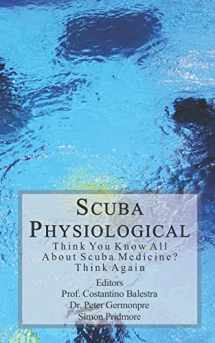
Scuba Physiological: Think You Know All About Scuba Medicine? Think again! (The Scuba Series)
Book details
Summary
Description
If you are a diver, what you learned about topics such as decompression sickness and narcosis in your scuba diving classes is unlikely to have been as complete as you thought. Most of it will have been over-simplified and some of it will just have been plain wrong, as diver training agency texts have not kept pace with the science. Scuba Physiological gives you a chance to catch up.
A recent book called The Science of Diving was a collation of work done by scientists in the field of decompression research as part of a three-year project called PHYPODE (Physiology of Decompression). The book did not reach the diving public; mainly because it was written by scientists for other scientists and they speak a different language than most of us. Simon Pridmore is not an expert on diving medicine but he knows something good when he sees it. When Simon read The Science of Diving (with help from Google), he thought it was worthwhile working on it to try to make it more accessible. The original authors agreed that this was a good idea and Scuba Physiological is the result.
There have been great advances to make diving safer, but, despite nearly 170 years of research, the fundamental nature of decompression sickness and decompression stress remains unknown and there are still glaring gaps in our knowledge. Scuba Physiological provides a good summary of what we know, as well as a glimpse of where the science is taking us and some invaluable tips to make you a safer diver now.
Among many other things, you will learn:
1. Pre-dive hydration, exposure to heat, whole body vibration and oxygen breathing may reduce the risk of DCS.
2. Post-dive, our bodies have most bubbles running around them 30 to 40 minutes AFTER we have surfaced. Post-dive hydration and certain other post-dive behaviours are therefore also essential.
3. The effects of nitrogen narcosis continue for a period of time AFTER a dive.
4. All dive computers have a known DCS risk rate.
5. Exercise during the period up to 120 minutes after surfacing may increase your risk of DCS.
6. Never use a weightlifter's breath-hold and release technique when pulling yourself into the boat post-dive.
7. A little dark chocolate before a dive may be a good thing for you.
What the experts say:
"This book makes it easy to understand the latest discoveries in diving research and our current understanding of what happens to our bodies when we dive." JP Imbert: Decompression designer and technical diving pioneer
"There are some lovely thought-provoking ideas and questioning of current dogma. This book is well worth the read. " Dr Ian Sibley-Calder, HSE Approved Medical Examiner of Divers, Occupational Health Physician
"If you ask a lay person what causes DCS they will likely tell you, "I don't know, I think it has something to do with bubbles". If you ask a dive instructor they might discuss things like shaking a soda bottle. And, if you ask a physician, you may get an account referring to things like leukocyte adhesion, the coagulation of components inside a vein and the endothelium lining. Finally, you find one of the top people in the world who do hyperbaric research on divers, ask them the same question and they will say, "I don't know, I think it has something to do with bubbles. The bottom line is that we don't necessarily know what causes DCS. This book is an excellent discussion of what the third person you asked in the above scenario might say. It is an enjoyable, simplified read of a complex subject and easy for a non-scientist to comprehend. I consider this an essential text for every diver's shelf." Joseph Dituri PhD (c), CDR, US Navy Saturation Diving


We would LOVE it if you could help us and other readers by reviewing the book
Book review



